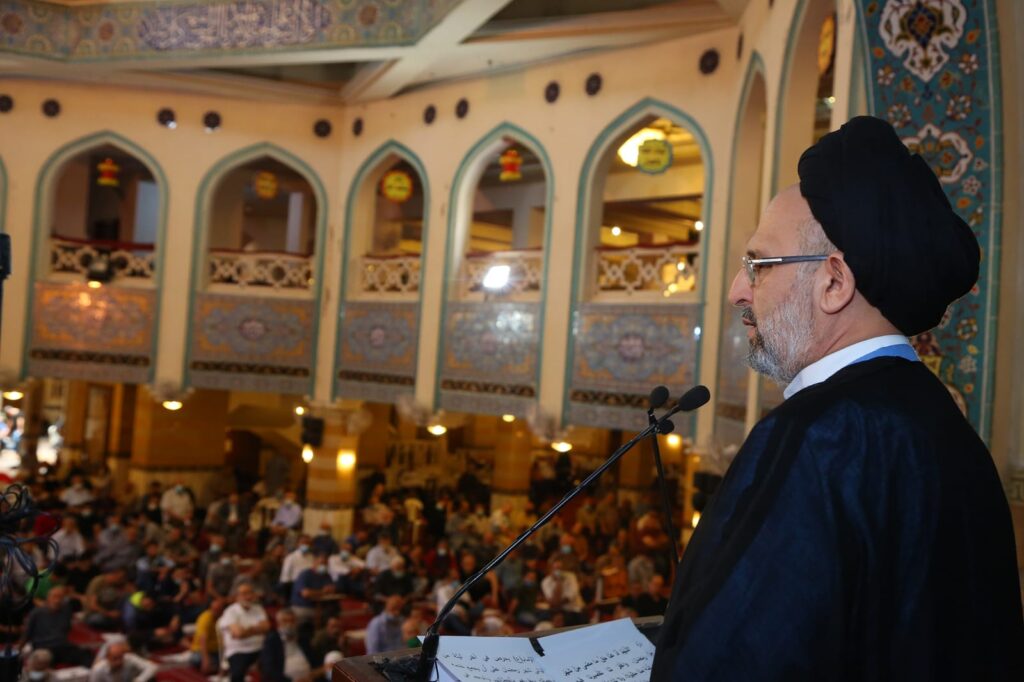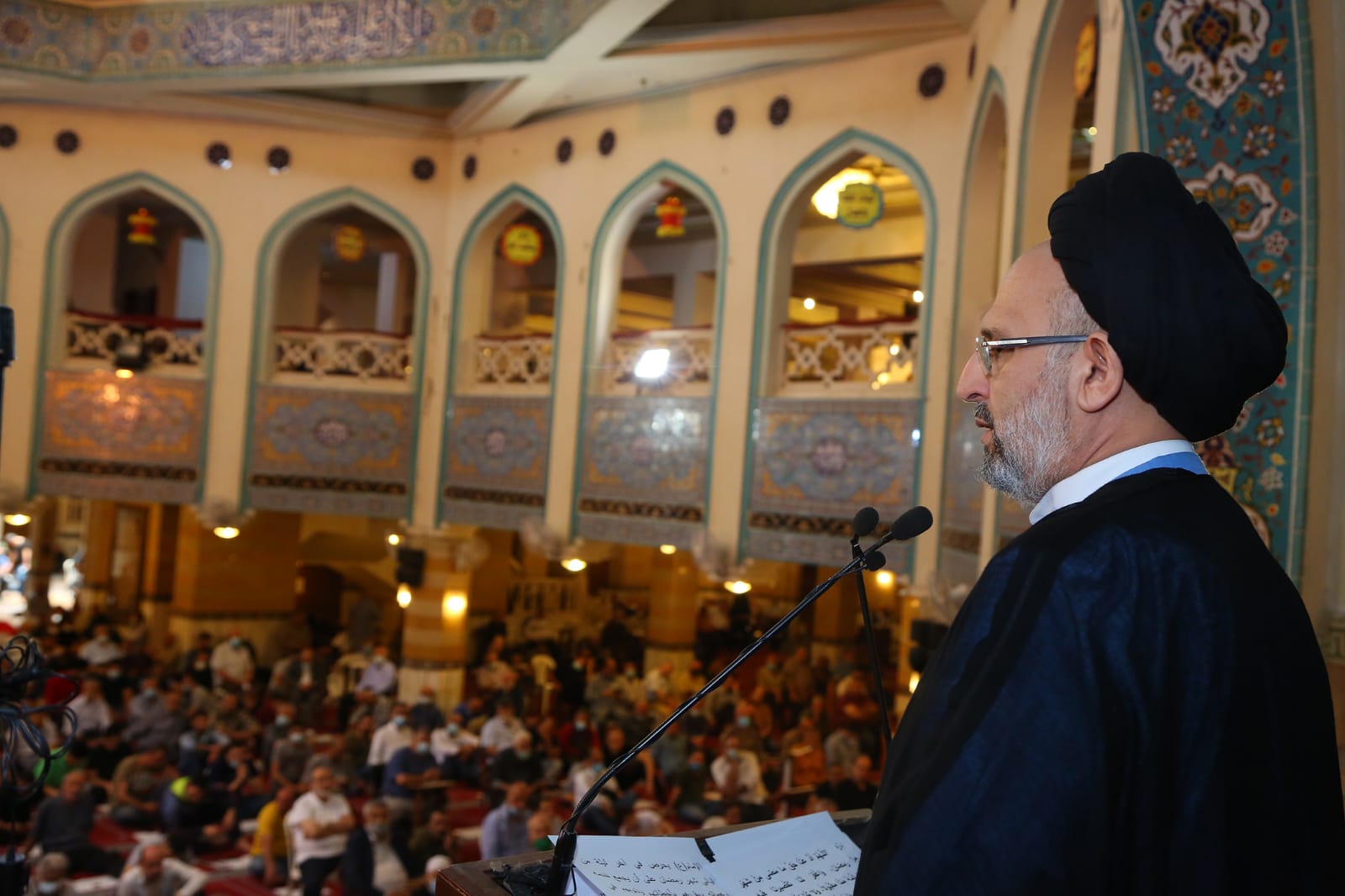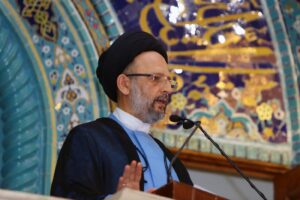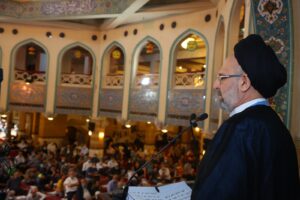In The Name of Allah, The Compassionate, The Merciful.
His Eminence, Sayyed Ali Fadlallah, delivered the two Friday prayer sermons at the Imamain Al-Hassanain Mosque, Ramadan 12, 1445 /March 23, 2024. Several prominent religious scholars, dignitaries, and hundreds of believers attended the Jumu’a prayer. Following is a summary of the sermons.
The First Sermon
Fraternity in Islam
Allah, the Most Exalted, says in His Glorious Book: “And [also for] those who were settled in al-Medina and [adopted] the faith before them. They love those who emigrated to them and find not any want in their breasts of what the emigrants were given but give [them] preference over themselves, even though they are in privation. And whoever is protected from the stinginess of his soul – it is those who will be the successful.” Allah, the Most Exalted, speaks the truth
On this twelfth day of the blessed month of Ramadan, we encounter an event that we must pause to reflect upon its lessons and insights. It is the fraternity that occurred in Medina between the emigrants and the supporters (Ansar). The Prophet united the strong with the weak, the rich with the poor, and the white with the black…
One of the outcomes of this fraternity was that the Ansar divided with their Muhajir (emigrant) brothers who migrated from Mecca to Medina, leaving behind their wealth. They shared their lands, homes, and work places with them. They made them feel they were not strangers in Medina but rather its own people. They, thus, set a pioneering example of Islamic fraternity, as indicated by the verse we have recited, which says: “And [also for] those who were settled in al-Madinah and [adopted] the faith before them. They love those who emigrated to them and find not any want in their breasts of what the emigrants were given but give [them] preference over themselves, even though they are in privation.”
This event practically exemplified the brotherhood that Allah had called for. He wanted it to be the hallmark of the relationship between believers, regardless of their tribes, families, nationalities, races, languages, ages, or wealth. They were to live the bonds of brotherhood in emotions, sentiments, behavior, and joint action, in accordance with what Allah called for when He said: “Indeed, the believers are but brothers.”
Allah founded this brotherhood on the basis of a single faith, values, and common goals, making it deeper than the blood brotherhood, which, although Islam respects and does not deny, may not always witness harmony among its members in orientations, ideas, values, and goals. We all know the importance of this fraternal bond and the role it plays when it deepens in souls and its impact manifests in reality, in unifying society, enhancing its immunity, and eliminating tension caused by differences in ethnicity, color, tribe, family, or homeland.
The noble Hadiths came to invite and urge for this brotherhood and to adhere to its principles. The Prophet (p.) said: “Do not envy one another, do not hate one another, do not turn your backs on one another, do not undercut one another… but be brothers… And in another Hadith: “The believer is the brother of the believer. He does not betray him, deceive him, or forsake him.” And Allah’s Messenger (p.) said: ” The believer is the brother of the believer, whether he loves him or dislikes him.”
It has been considered that denying this fraternal relationship and not adhering to it leads to disbelief. For it has been mentioned in the Hadith: “Whoever says to his brother ‘You are my enemy,’ has disbelieved.” As for why it leads to disbelief, it is because by doing so, one contradicts what Allah has called for and emphasized: “Indeed, the believers are but brothers.”
Allah, the Most Exalted, indicated that this brotherhood is a blessing, indeed one of the most important blessings bestowed upon His believing servants. When He says: “And remember the favor of Allah upon you – when you were enemies and He brought your hearts together and you became, by His favor, brothers. And you were on the edge of a pit of the Fire, and He saved you from it.” And He says to His Messenger (p.): “And if you had spent all that is in the earth, you could not have brought their hearts together; but Allah brought them together. Indeed, He is Exalted in Might and Wise.”
Allah, the Most Exalted, did not intend for this fraternal bond to stop at the level of emotions, sentiments, and feelings. Rather, He called for it to extend to rights and duties. There are rights and duties that a believer must fulfill for his fellow believer. These are not options but obligations, and a person will be questioned about them when standing before Allah. These obligations are:
Firstly: To love for one’s brother what one loves for oneself, and to hate for him what one hates for oneself. For a person is not truly a believer until he loves for his brother what he loves for himself and hates for him what he hates for himself.
Secondly: To assist him with one’s self, wealth, tongue, hands… and not to forsake him in times of need. For it has been mentioned in the Hadith: “Allah, Allah is in the aid of the believer, as long as the believer is in the aid of his brother”.
Thirdly: To be his mirror… guiding him to his faults. For the believer is a mirror for his brother, guiding him if he errs and helping him to overcome his faults…
Fourthly: Not to satisfy oneself while one’s brother is hungry, not to quench one’s thirst while one’s brother is thirsty, not to clothe oneself while one’s brother is naked…
Fifthly: To fulfill his oath, respond to his invitation, visit him when he is sick, attend his funeral, and if he has a need (financial, or otherwise), to hasten to fulfill it without waiting for him to ask, and to fulfill any promises he made.
Sixthly: To maintain ties with him and not to sever them in times of disagreement or dispute. For it has been narrated in the Hadith: “It is not permissible for a believer to shun his brother for more than three days, and the one who initiates the greeting is closer to Allah’s mercy.”
Seventhly: To support him, whether he is oppressed or oppressing. For the Messenger (p.): said “Support your brother, whether he is oppressed or oppressing.” It was asked: “O Messenger of Allah, I understand supporting him if he is oppressed, but how should I support him if he is the oppressor?” He replied: “By preventing him from wrongdoing or deterring him from it.”
Lastly, not to cause him any harm, whether physical, material, or psychological. For in the hadith it is said: “A believer is forbidden to harm another believer, whether it is his blood, wealth, or honor”…
Dear loved ones, we are in dire need of reinforcing the value of this brotherhood, to build a society that Allah desires, one that is cooperative, compassionate, supportive and where hearts are united. This is what the Prophet (p.) indicated: “The example of the believers in their affection, mercy, and compassion is like that of a body. When any limb aches, the whole body reacts with sleeplessness and fever… and their souls are from one soul.” And he also said: “A believer to his brother believer is like a thirsty person who finds cold water.” This is what Allah, indicated: “Muhammad is the Messenger of Allah; and those with him are forceful against the disbelievers, merciful among themselves. You see them bowing and prostrating [in prayer], seeking bounty from Allah and [His] pleasure. Their mark is on their faces from the trace of prostration. That is their description in the Torah. And their description in the Gospel is as a plant which produces its offshoots and strengthens them so they grow firm and stand upon their stalks, delighting the sowers – so that Allah may enrage by them the disbelievers. Allah has promised those who believe and do righteous deeds among them forgiveness and a great reward.”
Muhammad (p.) was able, with this supportive, cooperative, and compassionate community, to achieve victories and build a civilization from which the world still benefits. Allah, the Almighty, indicated: “You are the best nation produced [as an example] for mankind. You enjoin what is right and forbid what is wrong.”
In this difficult stage, we are in dire need of adhering to this brotherhood, deepening and reinforcing it, expressing it in our behavior and relationships, and turning it into joint projects and initiatives. By bridging communication with others, we can emerge from all the crises, tensions, and conflicts that may arise due to the diversity we experience, and build a loving, cooperative, and compassionate community. Thus, we can truly be the best nation produced for mankind, calling for goodness, enjoining what is right, and forbidding what is wrong.
Let our prayer on this path be: “O Allah, forgive us and our brothers who preceded us in faith, and do not place any animosity in our hearts…
The second sermon
Worshippers of Allah, I advise you and advise myself with what the Messenger(p.) said in his sermon at the beginning of the month of Ramadan: ‘Remember your hunger and thirst in it, hunger on the Day of Resurrection and its thirst.
He wants us to recall our hunger and thirst on the day when people rise to the Lord of the worlds; the day when every soul will argue for itself and present its account to its Lord for what it has done in the world and what it has earned from it. As for why people will feel hunger and thirst on that day, it is due to the prolonged state of accountability that comes from their shortcomings in fulfilling their duties and the abundance of faults and their consequences which requires them, when they feel hunger and thirst, to review their accounts and hasten to repent for And when that happens, we will neither feel hunger nor thirst …And thus we will be more aware, responsible, and capable of facing challenges.
The beginning starts with Gaza, where the Zionist enemy continues its massacres against civilians, whether they are in their homes, or those desperately seeking aid to alleviate their hunger and quench their thirst, or those forced to resort to hospitals hoping to find some safety there, only to be pursued by the enemy even there.
But it doesn’t stop there. Today, they are pursuing a new policy aimed at targeting officials of the civil administration in Gaza, spreading chaos within it, and preventing any Palestinian effort to improve their living and life conditions and meet their needs. This drives them(the palestinians) to despair of staying in their land and pushes them to leave it, as all the elements of life in it disappear.
Unfortunately, the world, except for rare instances, still turns a blind eye to what is happening, and if there are any initiatives underway, they come in the form of wishes without these actors exerting any pressure to stop the massacres of this entity and open the crossings. Instead, we continue to witness more support for it at all levels.
We have said to this world: The Palestinian people do not need words of condolences or formal condemnations, but rather a vigilant conscience and serious stances to deter this entity and stop the suffering of this people, to completely halt the blood shedding, destruction, and imposed siege.
We hope that the world has become more aware of the danger of continuing this insane war, which will be a stigma on its forehead and will not be erased, and of its implications for its stability and security, and that the steps being discussed will accelerate to achieve the desired results and reach a ceasefire…
At this time, we renew our call to the Palestinian Authority and to all factions and resistance movements to unite and not to raise any voice or movement that undermines it. And if there are disagreements, they should not be resolved through media means and statements that distort the image of the Palestinian people and their cause and provide free services to the enemy to help achieve its goals.
And we return to Lebanon, where the Resistance continues to play the role it has drawn for itself, offering sacrifices for it by supporting the Palestinian people in Gaza and preventing the Zionist enemy from isolating them and leaving them to suffer alone. This is done within the limits of targeting the enemy’s military sites and not expanding its scope, in order to safeguard the supreme national interest and take into account the circumstances of this country and the suffering of its people, at a time when the enemy continues its attacks and systematic destruction of homes and residential buildings, especially in the border villages, and its threats to Lebanon by announcing plans ready to invade it, and what it recently announced about forming a new brigade to manage the war in Syria and Lebanon, aimed at instilling fear among the Lebanese and enhancing division among them, at a time when the Lebanese know that what is happening is mere intimidation and that the conditions for a comprehensive war that the enemy threatens by are not available, as it is incapable of engaging in it, nor does it have the international cover it had in its war on Gaza, as it pleads for it through international envoys.
It is regrettable that there are those in this country who do not see the Zionist enemy as a threat to Lebanon, nor do they see the threats it directs towards it as a danger to its sovereignty and take them into account.
In the face of all this, we warn the Lebanese not to fall into the trap that the enemy wants to lure them into by transferring the battle to within them and among them, and to maintain continuous awareness of the risks of this entity, which remains a threat not only to a faction of the Lebanese, but to Lebanon and all Lebanese.
At this time, we repeat our call to the political forces not to surrender to the vacuum and the crises that this country is suffering from, and not to leave it hostage to what is happening in Gaza. The time has come to address all this, accomplish the presidential and then the governmental entitlements, and build the state, which cannot be achieved by dominance but by consensus in a country built on consensus and continues on it…
.





